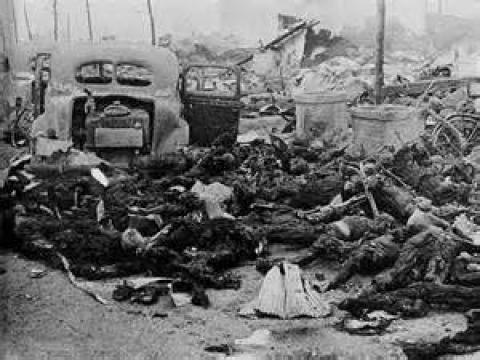H. Patricia Hynes
PortsideAugust 4, 2014

Nagasaki atomic bomb blast aftermath
harrymcfee.com
On the anniversary of the U.S. dropping atomic bombs on Hiroshima and Nagasaki, nine countries – the United States, Russia, China, Britain, France, Israel, India, Pakistan and North Korea – possess the demonic capability to annihilate the human race and render the Earth uninhabitable. Combined, these countries have 16,300 nuclear warheads, 93 percent of which are maintained and deployed by the United States and Russia, now locked in hostilities over the Ukraine. In fact, serious conflicts fester in every region of the other nuclear nations: South and East Asia, the Korean peninsula and the Middle East.The anniversary of the United States dropping the atomic bomb on Hiroshima and Nagasaki compels us to think more deeply about the continued existence and fate of nuclear weapons. Both cities were populated, not military sites as President Truman alleged; and many top U.S. military commanders at the time condemned the bombing as unnecessary for victory, inhumane and immoral. The act also instigated a nuclear arms race that is not abating, despite decades of an international non-proliferation treaty.
Experts today agree that nuclear-armed states are increasing their militaristic posturing and ignoring their international obligations under the 1970 Nuclear Weapons Non-Proliferation Treaty to disarm for the sake of world security. Three of them – China, India and Pakistan – are actively increasing their arsenal of nuclear weapons, while the U.S., Russia, Britain and France are either constructing new nuclear weapon delivery systems or have announced plans to do so. Collectively they are spending an estimated $100 billion annually on these weapons of mass destruction. Pick your issue of human suffering and insecurity – hunger, poverty, illiteracy, human trafficking, unemployment, climate change – and envision what $100 billion could do.
The non-nuclear nations of the world are clamoring for disarmament and have, through the United Nations, pleaded with the nuclear nations to re-commence mutual disarmament negotiations for achieving and maintaining a world without nuclear weapons. To this end, non-nuclear nations and the UN have held conferences in 2013 and 2014 on the global consequences of deliberate or accidental detonation of nuclear weapons on human health, food and water, climate change, and the economy. Notably absent were the nuclear nations.
Mayors of U.S. cities are equally alarmed about the extreme danger of these weapons and the theft of resources away from cities and towns. President Obama’s proposed budget for FY 2015 requests $8.7 billion for maintenance and modernization of nuclear bombs and warheads and their support system of laboratories and factories. Further, the Government Accounting Office estimates that the government will spend an estimated $700 billion to $1 trillion over the next 30 years on replacing nuclear weapon delivery systems, bombers, missiles and submarines. This death money comes from the coffers of our taxes.
In their 2014 Conference of Mayors, U.S. mayors called on the President and Congress to reduce and direct nuclear weapons spending solely to secure existing weapons until they are disabled and dismantled and “to redirect those funds to meet the urgent needs of cities.” They also called on the United States to commit to its disarmament obligation under the Non-Proliferation Treaty (NPT) by initiating a process of negotiation for the elimination of nuclear weapons, within a timeframe and under international control, at the upcoming May 2015 NPT Review Conference.
Most recently a tiny David has risen to challenge the nuclear Goliaths of the world. The Republic of the Marshall Islands filed a landmark (and much heralded) case in the International Court of Justice in The Hague against the nine nuclear-armed nations for failing to comply with their obligations under the Non-Proliferation Treaty and customary international law to pursue negotiations for the global elimination of nuclear weapons. They filed a companion suit against the U.S. in Federal District Court in San Francisco.
From 1946 to 1958, the Marshall Islands were plagued and poisoned with 67 above-ground nuclear weapons test explosions conducted by the United States. The U.S. Atomic Energy Association described the North Pacific island country as “by far the most contaminated place in the world.” Sacrificed for America’s Cold War weapons buildup, the Marshallese people have vowed “to fight so that no one else on earth will ever again experience these atrocities.”
No high-level military insider has renounced nuclear weapons so starkly and definitively as retired Air Force General Lee Butler, former commander of the Strategic Air Command that oversaw the entire nuclear arsenal. In December 1996, he used a National Press Club luncheon as a forum to urge his government to take the lead in abolishing all nuclear weapons. “Nuclear war,” he said, “is a raging, insatiable beast whose instincts and appetites we pretend to understand but cannot possibly control.” Nothing, he concluded, not peace, nor deterrence, nor national security, justifies these weapons of physical and genetic terror.
The pity here is that he waited until retirement to speak out.
[H. Patricia Hynes is a retired professor of environmental health from the Boston University School of Public Health. She directs the Traprock Center for Peace and Justice and is a member of Nuclear Free Future.]
Posted by Portside on August 4, 2014